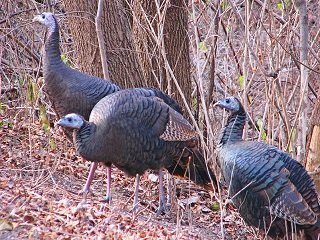 Turkey hunting really stalls out during most inclement weather. Bad weather strategies are time proven and if you are not prepared to adapt to the harshness of nature, then you should be. Here are some of the tactics that I have learned to use after decades of hunting turkeys and being a turkey hunting guide.
Turkey hunting really stalls out during most inclement weather. Bad weather strategies are time proven and if you are not prepared to adapt to the harshness of nature, then you should be. Here are some of the tactics that I have learned to use after decades of hunting turkeys and being a turkey hunting guide.
Hot Days
To me, hot, dry days are the worst. It really shuts down the bird communications and it can zap your confidence if you are a new turkey hunter. Nothing makes sense as birds seem to go quiet and simply disappear. When I went looking for birds on hot days after they failed to show up at their favorite fields, I have most likely found them loosely huddled in groups in the thickest shade available. In their refuge from the sun and heat, they usually mill around and half-heatedly scratch around pretending to look for meals, but really they seem bored and are just waiting out the heat while milling around in a half-sleep, half-awake state. You can forget about getting them fired up once they have given up on the day.
Obviously, shady birds will be near creek or river bottoms where shade and water are prevalent, so if you can cut loud to get an answer, you might have a chance of sneaking up on them as they act like turkey zombies.
Windy Days
Usually if it’s windy during the morning, it means it was windy during the night and that means grouchy, unrested turkeys. Hunting grouchy turkeys sounds like a funny play on human life, but I promise it is a true phenomenon. I have seen it many times. Grouchy birds don’t play well and if it is windy, their troubles have only begun once they fly down. Unable to hear danger and thinking every wind-whipped bush or branch is possible danger, they get on edge and stay that way.
If it is going to be windy, then plan on trying to find a leeward side of a ridge or a nice valley to hunt in to prolong your hunting day. Winds are less affective behind natural barriers and obstacles and you can use this to your advantage.
If you live in flat country, hunt early morning only and don’t waste your time or the turkey’s time by continuously blowing calls and educating them when you have no realistic intention of calling them in. Besides, the wind always picks up when the sun starts heating up the atmosphere.
If you are going to call early in moderate winds, use slate or box calls. The friction calls are always louder and easier for a bird to hear through the wind.
One other thing to remember, if you hear a gobbler answer you, get set up fast because he is always going to be closer than he sounds on a windy day.








